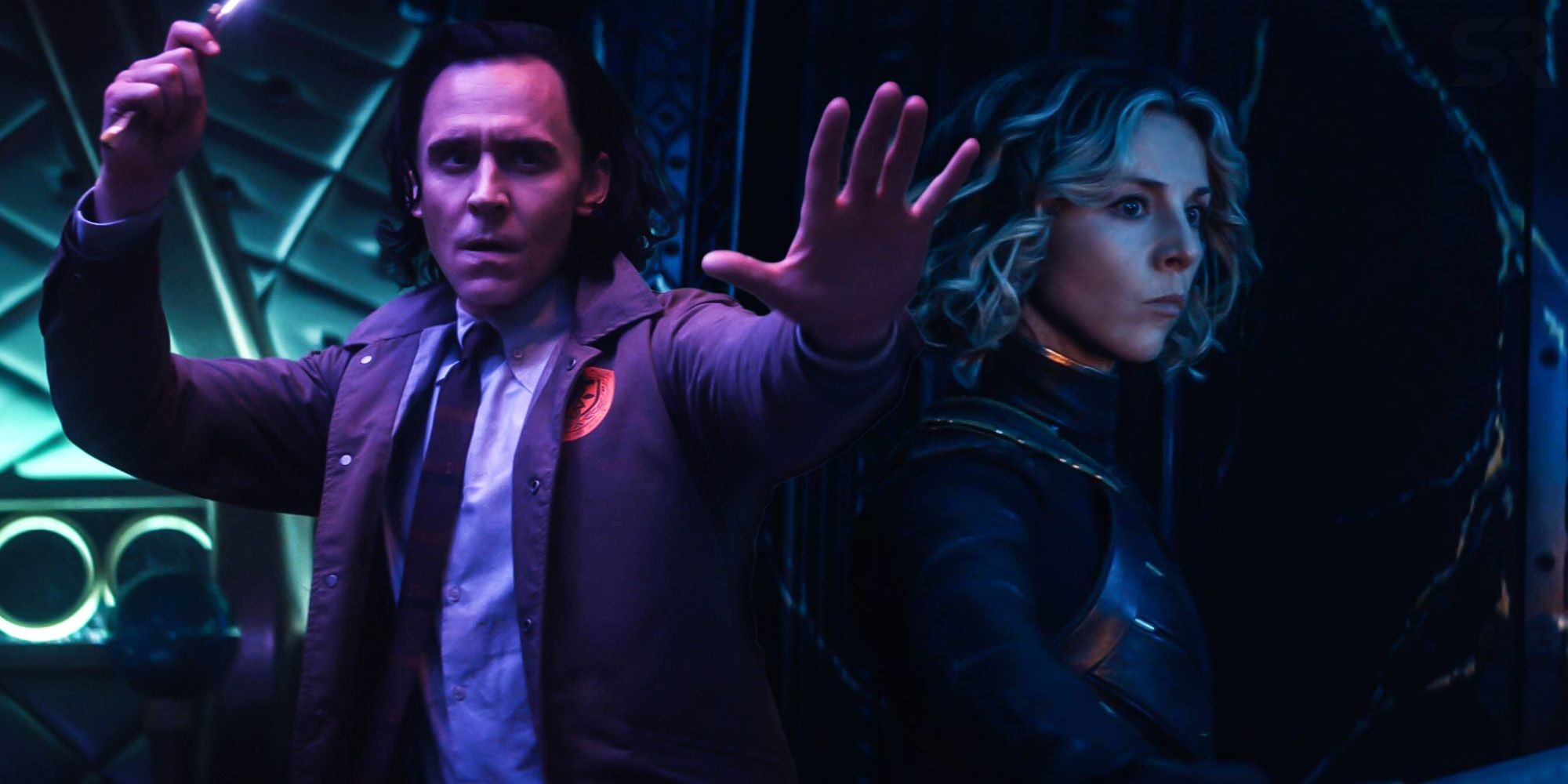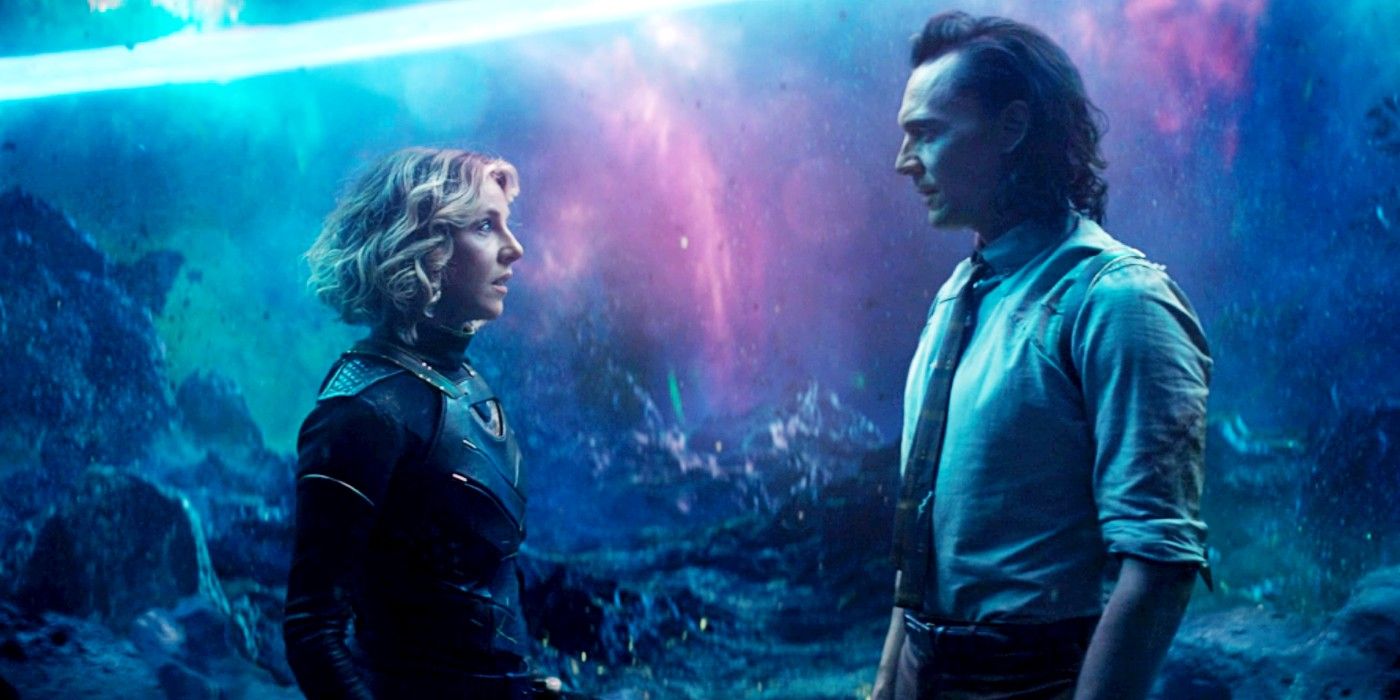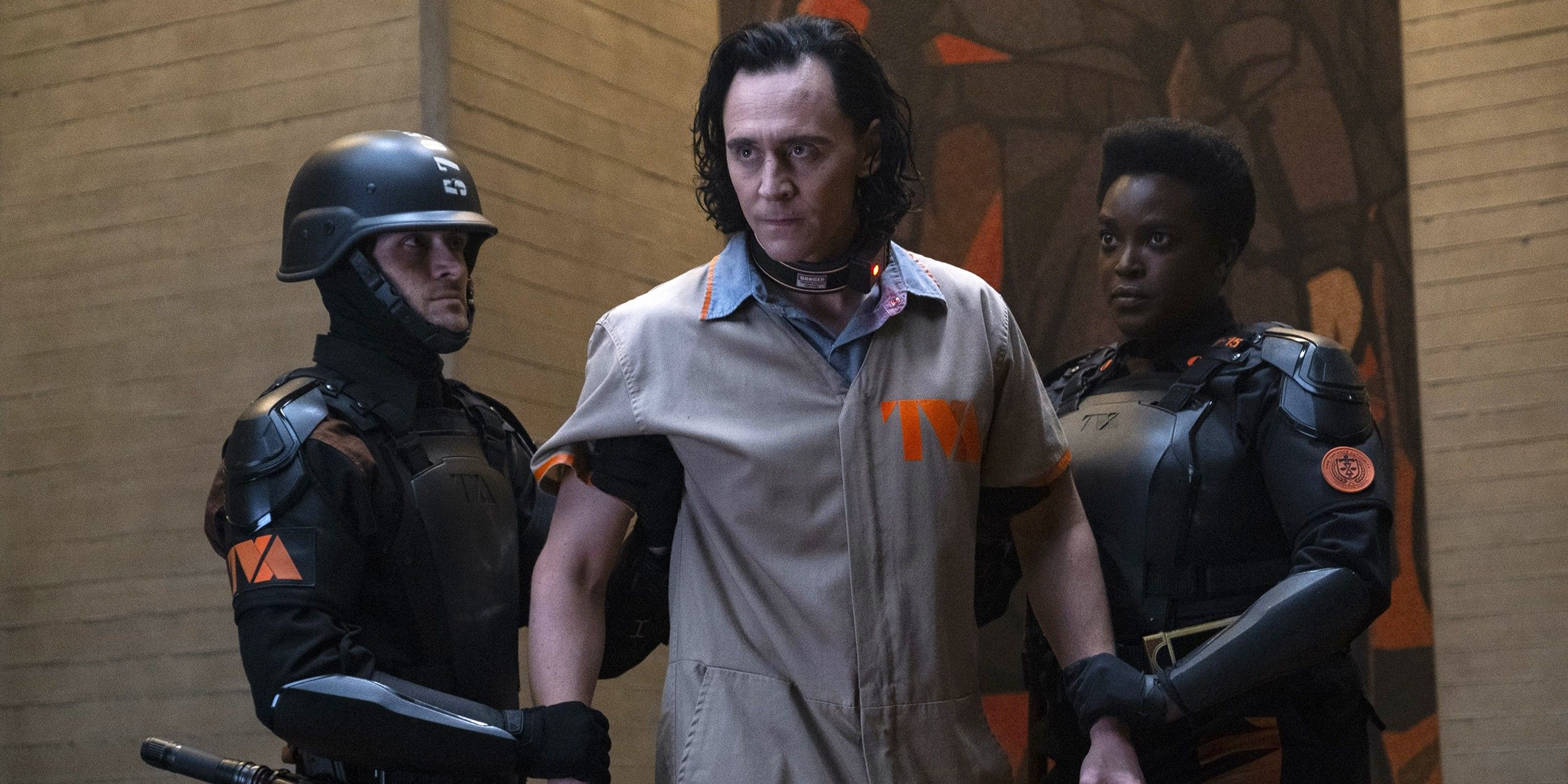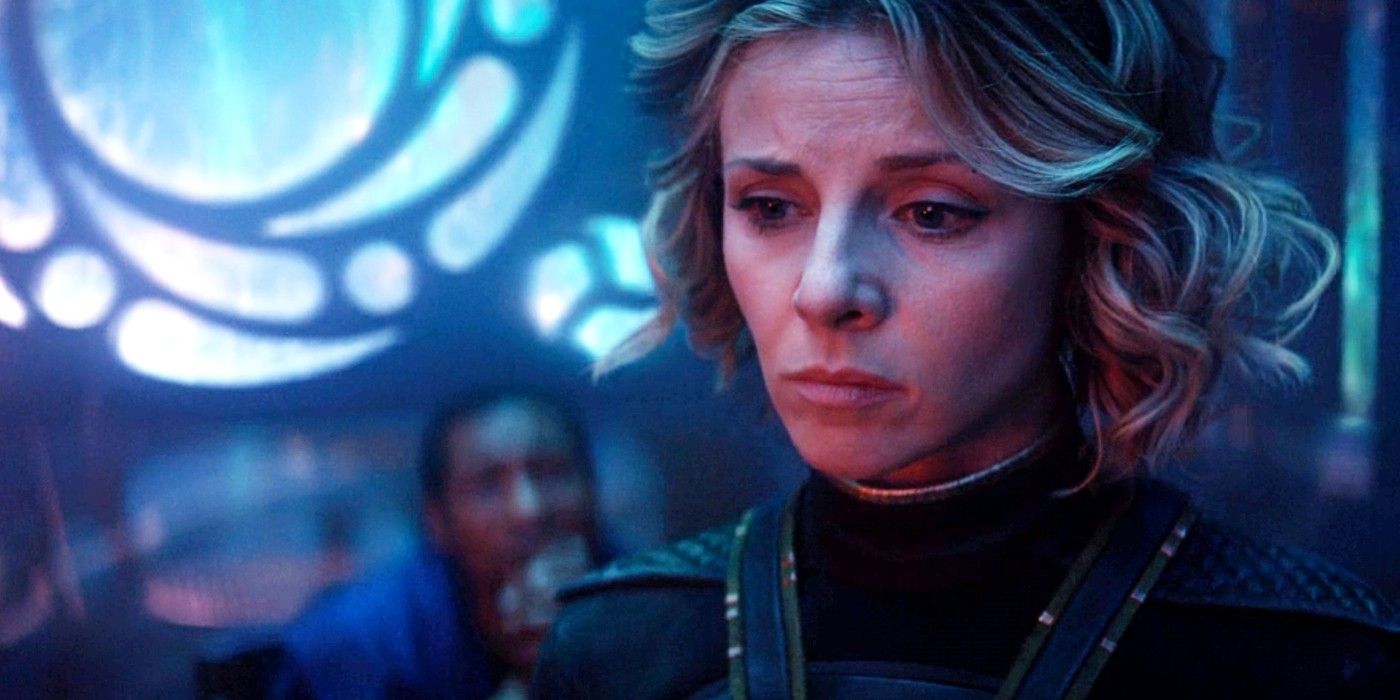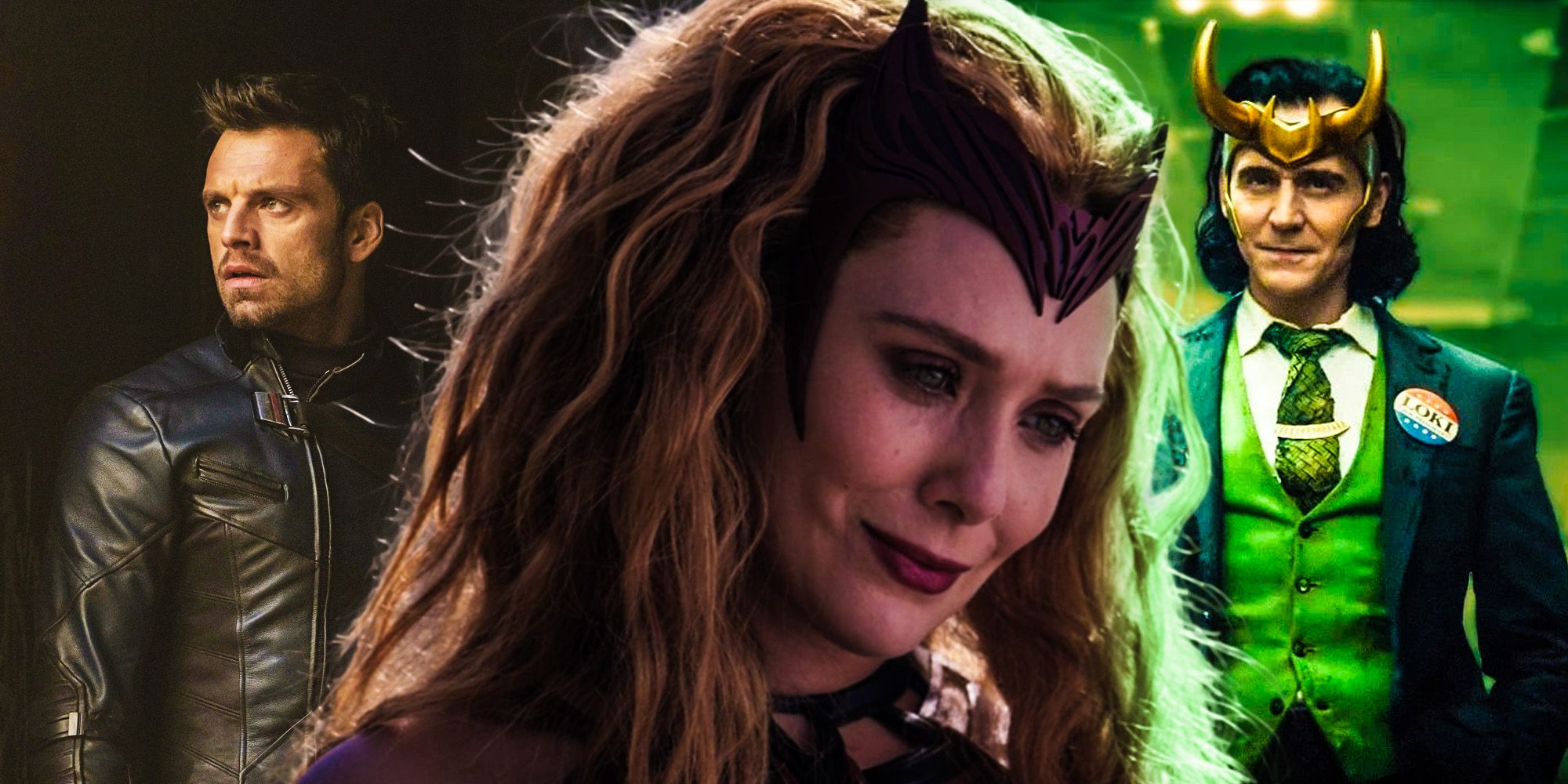Warning: SPOILERS for Loki episode 6, "For All Time. Always."
Loki season 1 finale has been criticized for being a let down, but despite some issues, it ultimately works for the story the show is telling and the broader MCU. After WandaVision and The Falcon and the Winter Soldier, Marvel Studios wrapped up its third Disney+ series that focuses on the God of Mischief. The six-episode project sends the trickster on a new adventure where he carves his own path separate from his brother, Thor (Chris Hemsworth).
Kicked off by his escape in the botched New York leg of Avengers: Endgame's time heist, Loki finds himself captured by the Time Variance Authority/TVA. It's an organization that safeguards the Sacred Timeline in an effort to prevent another multiversal war. Supposedly created by the Time-Keepers, it enlists the help of Loki to hunt down a female variant of himself, Sylvie (Sophia di Martino), who has been leaving trails of dead Minutemen. But, once the pair get together, the Asgardian Prince learns that his hunch about the TVA not being what it seems turned out to be true. So, together with Sylvie, they decide to get to the bottom of the mystery by tracking down who really is behind the whole operation.
After weeks of building its story, Loki episode 6 delivered on its promise by unveiling the being who created the TVA. Thanks to the help of some of their allies like Agent Mobius M. Mobius (Owen Wilson) and Hunter B-15 (Wunmi Mosaku), as well as other variants like Classic Loki (Richard E. Grant) and Kid Loki (Jack Veal), Loki and Sylvie found He Who Remains (Jonathan Majors). Essentially a version of Kang the Conqueror, he revealed to have created the organization in an effort to prevent his other selves from wreaking havoc. Sylvie wasn't impressed, however; she forcefully pushed Loki back into the TVA, going ahead with killing He Who Remains. The events of this whole encounter led to the MCU's multiverse being unleashed.
Why Loki's Ending Disappointed Some
Despite getting generally positive reviews, not everyone is happy with the way Loki wrapped up. Some viewers claim that Loki was sidelined in the finale, and for a show that is named after him, that shouldn't be the case. Looking back at the episode, it could very well be interpreted that way. After all, for most of the episode, Loki and Sylvie sat down and listened to He Who Remains explain the origin of the multiversal war and the TVA, while also describing what could happen next. The episode came off more like exposition and setup for the future rather than a proper conclusion to the journey that began with Loki's arrest.
Furthermore, throughout that journey in the actual finale, the God of Mischief's actions were mostly dictated by what Sylvie wanted to do. By the time he stood up to her after disagreeing on how to handle the information about the real importance of the TVA, he couldn't do anything to convince her. She had made up her mind and couldn't be swayed by any means, including Loki physically fighting her. In the end, Sylvie bested and forced him out of the situation - sidelining him from the core story, for all intents and purposes. At that point, she became the Loki the series was about. And from there, he was deemed insignificant for the events that followed, except for the clear set-up for Loki season 2 once he returned to the TVA.
Loki's Ending Role Was The Right End To His Arc
The frustration over the lack of focus on its titular character in the Loki finale is somewhat understandable. The villain-turned-anti-hero has been a fan-favorite since he debuted in the MCU back in 2011 through Kenneth Branagh's Thor. While he has appeared in a string of projects since then, the Disney+ show is his first leading role as the God of Mischief. So, there's an expectation that its whole story would revolve around him, especially since season 1 is only six episodes long. However, given the trajectory of his story arc, not being the center of attention at the end of his journey was the natural way to conclude the core arc.
Bringing back the villainous, 2012 version of Loki for the series, particularly after Loki died by Thor's side in defiance to Thanos in Avengers: Infinity War, there was a sense that Marvel was retreading on the past. But that couldn't be further from the truth, seeing as the series offered Loki a proper road to self-discovery and redemption, one that wasn't fully explored on the big screen. So starting with a pre-redeemed version of the character who was still convinced the universe owed him something, Loki transformed him into an empathetic, cooperative, and good-willed being. His personal redemption was reflected in Loki's overall storytelling. Instead of vying for attention, control, and power, becoming someone who could turn down wielding the Infinity Stone and becoming the king of Asgard was truly an achievement for him. He finally found his glorious purpose - it just had nothing to do with power. In the end, it was accepting his place in the grand scheme of things, even knowing that it meant him not being at the forefront of the story.
Loki Became Sylvie's Show In Episode 4
Sylvie didn't make a proper appearance until the end of Loki episode 2 when Loki and Mobius successfully tracked her to Alabama in 2050. She spent most of episode 3 with the God of Mischief on Lamentis-1 trying to escape the doomed moon, which was on the precipice of annihilation. But, it wasn't until episode 4 that her backstory was fully established; it's revealed that she was still a young girl when the TVA abducted her, although, she managed to escape their clutches before being pruned. Since then, she had been on the run. This was the point where the Loki series became her show; her eagerness to take down whoever created the TVA drove the entire narrative from that point forward, and Loki was just along for the ride.
And because of Loki's attraction to Sylvie, he was more than willing to follow her lead. Given that, it made sense that at the end of the show, it's her personal arc that gets a proper resolution. Sylvie successfully killed He Who Remains, and that's what only mattered to her, regardless of the bigger implications of his death. To an extent, this wasn't necessarily a problem since the show is called Loki. Even though Sylvie doesn't go by that name anymore, she is a Loki variant, just like the series' main Loki. Regardless of who was leading the story, the title wasn't lying as long as that person was still a Loki variant. It helps that Sylvie captivated audiences, because otherwise, there would've been more backlash for the sudden shift in the narrative.
How Loki's Ending Fits With The Other Disney+ Shows
Just like WandaVision, the Loki series is being criticized for having an underwhelming finale. Interestingly, however, the shows have opposite problems. Coming into the final episode of the Elizabeth Olsen and Paul Bettany-led series, there was an expectation that a bigger villain like Mephisto was going to be unveiled. Ultimately, though, WandaVision stuck with its core story, opting to focus on Wanda's grief instead of setting up the bigger universe. Some didn't like the way things panned out because of the assumption that its events will shape the MCU's future.
Loki, on the other hand, is being criticized for sidelining its main character and choosing to lay the groundwork for what's to come in the franchise, setting up multiple movies and shows instead of bringing Loki's journey to a proper end. Unlike WandaVision, the way Loki ended made sense for its overall story with the multiverse. There were no red herrings (something that WandaVision was accused of having one too many of) and every storytelling promise was delivered one way or another, though perhaps more subtly than expected. However, it didn't help that the final episode was mostly about the MCU's history and future villain.
Meanwhile, one of the biggest issues with The Falcon and the Winter Soldier's finale was the fact that it didn't give Bucky Barnes (Sebastian Stan) his due. His personal arc with Yori Nakajima (Ken Takemoto) felt rushed when it was set to be the emotional anchor of his journey. Now, this could be rectified in a second season, but Marvel Studios has yet to officially announce whether or not this will happen, or reveal where Bucky's story goes next. Meanwhile, Loki season 2 is already confirmed, giving viewers hope that pushing aside its main character in the finale doesn't really mean much since his story isn't over yet. Plus, with reports that Loki may soon find himself on the big screen again, it seems his new story is only just beginning, which is why the season 1 ending didn't need to feel like an actual ending - unlike the previous two Marvel series.
Loki will return for season 2 on Disney+.

